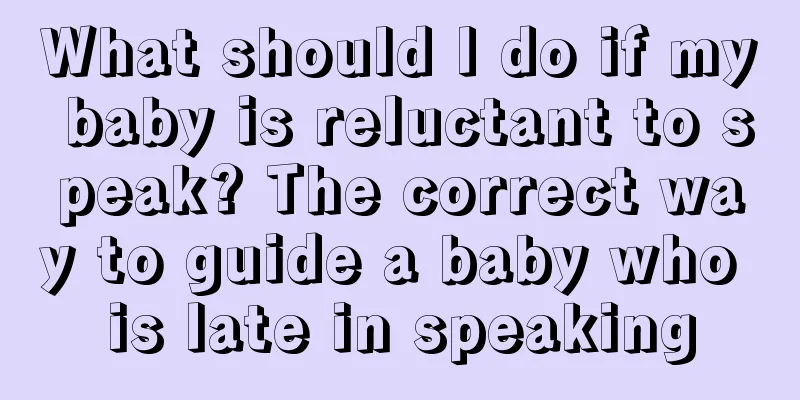What should I do if my baby is reluctant to speak? The correct way to guide a baby who is late in speaking

Parents are very much looking forward to their baby’s first word “Mom” and “Dad”, but some babies are slow to make any sound. Today I will talk to you about what situations consider a baby’s late speech, and how parents should correctly guide their baby’s language development when the baby is speaking.Tips for late talking4 tips to help you teach your baby to talk! "Talk" as early as possible: Don't wait until your baby can talk to him. You can talk to him as early as possible, even from the moment he is born. Of course, this conversation is mostly conducted in non-verbal ways, such as carefully recording and distinguishing the type of crying of the baby (hungry, sleepy, tired, afraid, etc. each have their own way of crying), and responding and satisfying accordingly. In addition, as the baby grows up, the baby's way of expression becomes richer and richer, and he begins to make various babbling sounds. At this time, imitate the baby, and he will definitely be very happy. Use "Mom Language": In daily life, when talking to a babbling baby, the mother (or other family members) often unconsciously slows down the speech speed, raises the voice and uses an exaggerated tone to say or repeat some short words or sentences. This is the so-called "mother talk". Babies are very fond of this because slow speech speed, exaggerated tone, high voice and repetition are the easiest for babies to understand, which can help them feel and learn language better. Be your baby’s “tour guide”: Babies are "new guests" in this world. They are confused even about the most basic things like bathing and eating. At this time, we need to be good "tour guides" for babies, such as using a friendly voice and changing tones to tell the baby about the things and events he is facing. A natural and friendly language "tour guide" is very effective in improving children's language skills and is also conducive to their social development. Become a "Reader": The practice of many outstanding families has proved that if you insist on reading aloud to your children, telling them more stories, and exposing them to excellent Chinese rather than traditional baby talk from the very beginning, your baby's language ability can develop to a surprising level. Why does the baby talk late?1. It may be due to mental retardation The most common cause of delayed language development is low intelligence. Intelligence and language are closely related, and language can better reflect a child's intelligence level than other aspects. Children with low intelligence cannot pay attention to what others say to them, cannot concentrate, have poor ability to imitate others' language, and cannot express and understand the meaning of words. Children with intellectual disabilities start to speak late and cannot express their ideas with words. Older children may speak irrelevantly, imitate language, repeat what others say to them as a response, and often repeat words, saying the same thing over and over again. When children with intellectual disabilities start to speak, they may be able to pronounce a word clearly, but they often forget it soon, so that they will not hear the word again within a few months. 2. Hearing impairment Hearing impairment can also affect language development. Children with severe hearing loss cannot learn to speak. If the hearing loss is not too severe, they can learn to pronounce by watching other people's lip movements. It is easy to learn sounds with obvious changes in mouth shape, such as "bo, fu, wu", but it is difficult to learn some sounds that rely on tongue movement, such as "ge, le, le", because the movement of the tongue cannot be seen. If hearing impairment occurs after children can speak, it generally does not affect their speech. However, if it occurs in the early stages of childhood, even a mild hearing impairment will affect their speech. 3. Family genetic factors Family factors are also related to the early or late speech. Some children have normal intellectual development, no hearing impairment, and no other diseases, but they just speak late. This kind of child is related to family inheritance, and the child's parents may also speak late. 4. Environmental impact Environmental factors have a great influence on children's language development. According to relevant reports, in Western society, children raised in charitable institutions have later language development than children from ordinary families, and they also start learning to speak and compose sentences later. 5. Parents’ educational methods and attitudes The educational level of parents and the degree of care they give to their children all affect their children's language development. Some parents constantly criticize their children's way of speaking or intonation, imitate and ridicule their children's incorrect speech. If you don't know how to pronounce the words, or rarely talk to your child, it will affect the child's enthusiasm for speaking and is not conducive to language development. Some people think that taking care of the child too much and preparing everything before the child asks for anything will affect his learning to speak. This view is incorrect. Some people also think that the child does not learn to speak because he is too lazy. This view is also wrong. The reason why the child does not speak is because he does not know how to speak yet. What are the signs of late speech?At 4 months old: cannot imitate the sounds made by father and mother. At 6 months old: Does not laugh or yell. 8-9 months old: Cannot use sounds to attract your attention; has not started babbling yet. At 10 months: Does not respond to others calling his name, and does not know how to let you know whether he is happy or annoyed. At 12 months old: He cannot use body language such as waving or shaking his head; he cannot utter one or two initial consonants (such as p, b, etc.); when he needs help, he does not know how to communicate with you. At 15 months: Does not understand words like "no" and "goodbye" and does not respond; can use less than 6 types of body language (such as waving hands, pointing at things, etc.); can say less than 1 to 3 words. At 18 months: Cannot say 6 to 10 words; cannot point to objects of interest, such as birds or airplanes flying in the sky. At 20 months old: can say less than 6 initial consonants. At 21 months: Will not respond to simple commands; will not pretend to play with dolls or on their own (such as combing their own hair, feeding dolls, etc.). At 24 months: cannot put two words together; does not know the functions of common household appliances (such as toothbrushes, telephones, chopsticks, etc.); cannot imitate other people's actions or learn to talk; cannot point out body parts when asked. At 30 months: No one, even family members, can understand him; he cannot speak simple sentences, ask questions, or make himself understood by strangers. By age 3: Does not speak in short phrases; does not understand brief instructions; has no interest in interacting with other children; has a hard time being separated from mom or dad. At 3 and a half years old: Often cannot speak complete sentences (for example, cannot say "go home", only "go back"). At 4 years old: He still stutters frequently and cannot be understood by others. |
<<: What are the treatments for baby tracheitis? What are the ways to improve baby's immunity?
Recommend
Can I eat goat's blood during the confinement period? Can I eat goat's blood during the confinement period?
As we all know, Chinese medicine has a saying tha...
Can I eat durian during confinement? How to eat durian during confinement?
Women are weak during the confinement period, so ...
What should pregnant women pay attention to when driving?
Pregnant mothers often have to face many problems...
Does eating durian during breastfeeding affect the baby? Will the baby be allergic to durian during breastfeeding?
What the mother eats during breastfeeding general...
What games to play with babies aged 0-6 months to make them smarter
Babies aged 0-6 months are still very young and c...
Can pregnant women eat oysters to promote fetal development?
Pregnant women can eat oysters. Oysters contain a...
Baby skin care products What skin care products are best for babies
The baby's skin is very delicate, and it is e...
How to treat Buddhist students? More humor and more love
On the surface, "Buddhist students" are...
What to do with postpartum hemorrhoids? How to treat postpartum hemorrhoids
Hemorrhoids are a very uncomfortable disease. Man...
Which part of the baby should be exposed to the sun? The best time for babies to bask in the sun in summer
Sunbathing is a regular activity for babies. Toda...
Can you feed your newborn baby when he hiccups? How to prevent your baby from hiccups
Newborn hiccups are a common phenomenon and are a...
Why are children too thin? How can children gain weight?
Usually, children's stomachs are very small, ...
How should I take care of myself when the due date is approaching? What are the key points of diet during the confinement period?
When the due date is getting closer, pregnant wom...
Can children with calcium deficiency be vaccinated? Why do children with calcium deficiency cry at night?
Usually, calcium deficiency in children is a seri...
What are the taboos during the confinement period? What should you eat during the confinement period?
The confinement period is a good time for women t...









